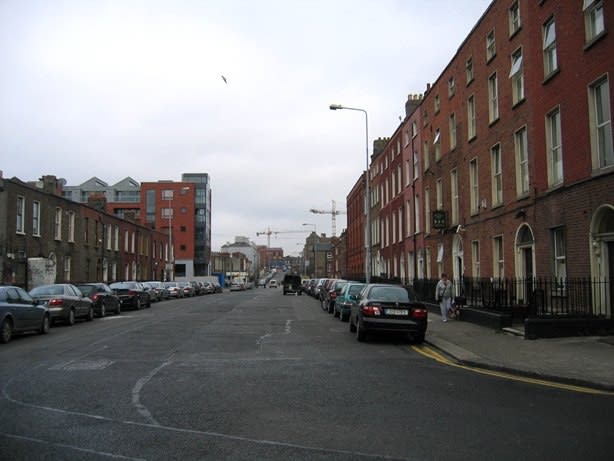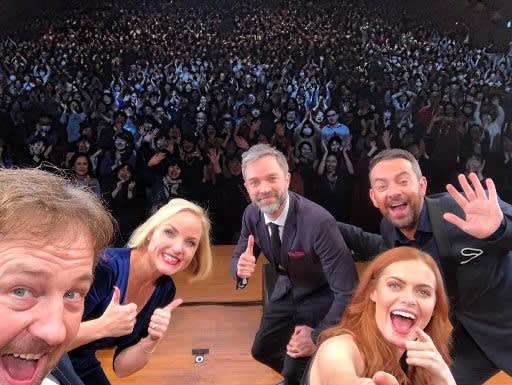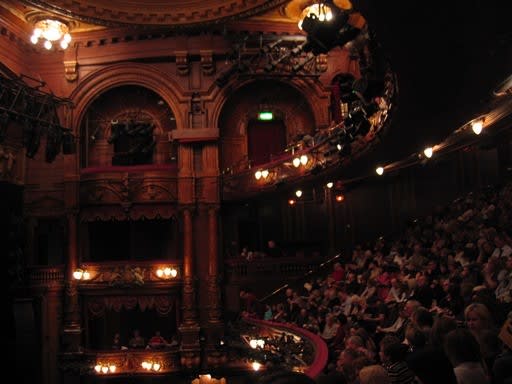Les Misérables (2012) - Epilogue Scene (10/10) | Movieclips
私がレミゼの"To love another person is to see the face of God.”の部分で感動するのは、一般的には決して幸福とはいえない人生を歩んだファンテーヌやエポニーヌやバルジャンが、最後にこの言葉を言うところにあるのですが(映画版ではエポニーヌの代わりにミリエル司教になっていますね)。
なんとなく気になってこの言葉を検索してみたら、映画版でバルジャンを演じたヒュー・ジャックマン(関係ないけど私はヒューが好き)のこんなインタビュー↓が出てきたのです。
I was struck in this iteration of Les Miz by how religious a story it is.
I like to think of it in modern-day sense — of course Hugo talks about Valjean undergoing not just a transformation but a transfiguration. He transforms in such a complete way that it’s religious in nature, not just emotional or physical. I think in some ways Hugo was attacking the church at that point, for being so exclusive. For Hugo, the line was “To love another person is to see the face of God” — that religion needed to be less about rules and sermons and more about practical love and the example of Jesus Christ. That’s the last line in the musical. I think it really annoyed the church! It was quite an attack.
Is Valjean someone we should learn from?
Yes, and for me, it’s the same example I got from my father. It’s a great honor to play someone like Jean Valjean, but it’s a daily reminder of how far you have to go as a person. It’s a really weird thing, playing Valjean and in between breaks going to your luxurious trailer just off set, like, Where the hell is my Evian? [Laughs.]
Tom Hooper said that it’s always difficult to play the good guy. How do you introduce complications to a character like that?
The trap with Valjean is that he can become kind of boring and saintlike after the first 10 minutes. He has a pretty massive transformation early on, going from being wrongfully imprisoned but still a kind of animal-like, voracious figure, and stealing from the man who gives him clemency and feeling the shame of that. The easy thing would be to play the saintlike figure throughout. That’s kind of dull. One thing that Hugo writes about at incredible length in the second half is Valjean’s relationship with [his adopted daughter] Cosette, and how complicated it is. Here’s this man at 51 who experiences love for the first time in his life — an avalanche of feeling and all the complications that come with that. As we all know, as human beings, once you know happiness, you’re terrified of losing it.
(Hugh Jackman: Les Miz’s Leading Man Talks to TIME(2012))
「"To love another person is to see the face of God.”の言葉は、実践的な愛やイエスの模範よりも規則や説教に重きを置きすぎて排他的になっていたカトリック教会に対する、ユゴーの痛烈な批判だったのだと思う。」と。
へえ、面白いな~ 。
。
日本人で無宗教の私は「キリスト教」とすぐに一括りにしてしまう悪い癖があるのだけれど、レミゼに限らず、こういう作品であちらの人達のインタビューを読むとさらに突っ込んだ解釈をしていますよね。キリスト教徒にとってもそうでない人にとっても、それだけキリスト教が日常に溶け込んでいるからなのでしょうね。
世界は知らないことだらけ。だから面白いのかもね。
ヒューは8歳から男手一つで自分を育ててくれた父親をバルジャンと重ねていて、「So church was a big part of our lives, though I don’t think I ever really heard my father talk about God or religion necessarily. He was just one of those quietly religious people who believed actions spoke louder than words.」と。
そしてバルジャンは聖者のように演じてしまうと退屈な役になってしまうのだ、と。「One thing that Hugo writes about at incredible length in the second half is Valjean’s relationship with Cosette, and how complicated it is. Here’s this man at 51 who experiences love for the first time in his life — an avalanche of feeling and all the complications that come with that. As we all know, as human beings, once you know happiness, you’re terrified of losing it.」と。私もそのとおりだと思う。弱いところもある人間らしいバルジャンだから、私達も自分に重ね合わせて感動することができるのだと思います。











 ?)。韻が素晴らしくてゾクゾクするんですよね。なのにわざとらしくなくて。
?)。韻が素晴らしくてゾクゾクするんですよね。なのにわざとらしくなくて。
 !と思ったら、カナダだった。。コルムさんの今のホーム
!と思ったら、カナダだった。。コルムさんの今のホーム








 ・・・せいぜい5年ぶりくらいかと思っていたら・・・。
・・・せいぜい5年ぶりくらいかと思っていたら・・・。 いい声
いい声 。贅沢を言わせてもらえばやっぱりコンサートじゃなく、またミュージカル本編の中で演技とともに聴きたいものだけれど、それでも来日してくれて本当に嬉しい
。贅沢を言わせてもらえばやっぱりコンサートじゃなく、またミュージカル本編の中で演技とともに聴きたいものだけれど、それでも来日してくれて本当に嬉しい ありがとう!
ありがとう! となりました。人の声ってどんな楽器よりも素晴らしいのではなかろうか、と改めて思ってしまった。4 starsのときの自分の記事を読み返したらそのときも「透明感」という言葉を書いていて、人の声がこういう透明感を感じさせるときに、私は強く心動かされてしまう。でもってJOJ、仕切りが上手すぎ笑。
となりました。人の声ってどんな楽器よりも素晴らしいのではなかろうか、と改めて思ってしまった。4 starsのときの自分の記事を読み返したらそのときも「透明感」という言葉を書いていて、人の声がこういう透明感を感じさせるときに、私は強く心動かされてしまう。でもってJOJ、仕切りが上手すぎ笑。


 。この曲を聴くのはコルムさん、ラミンに続いて3回目だったけど、いい曲だよねえ。毎回感動してしまう
。この曲を聴くのはコルムさん、ラミンに続いて3回目だったけど、いい曲だよねえ。毎回感動してしまう



 。おいおい~~~とは正直思いますが、でも最終日はとっても盛り上がったので満足です
。おいおい~~~とは正直思いますが、でも最終日はとっても盛り上がったので満足です

 みんな大好きです。
みんな大好きです。







 。当時はネット予約などなかったので、頑張ってチケットオフィスに英語で電話をして予約をしたこと以外は、舞台の記憶は殆ど残っていないのですが(私がオペラ座の怪人に初めて感動したのは、それから10年後のロンドンでした)。今思えばこの時RENTを観ておけばオリジナルキャストで観られたのだな~。
。当時はネット予約などなかったので、頑張ってチケットオフィスに英語で電話をして予約をしたこと以外は、舞台の記憶は殆ど残っていないのですが(私がオペラ座の怪人に初めて感動したのは、それから10年後のロンドンでした)。今思えばこの時RENTを観ておけばオリジナルキャストで観られたのだな~。 と20歳の女二人は本気で怯えたり(夜中に風でカタカタ誰かが上ってくるみたいな音がしたの)、ということを今回の舞台を観ながら20年ぶりに思い出しましたです。NYはそれから数年後にもう一度行って以来、行っていません。なのでツインタワーのないマンハッタンの景色も知らないのである。
と20歳の女二人は本気で怯えたり(夜中に風でカタカタ誰かが上ってくるみたいな音がしたの)、ということを今回の舞台を観ながら20年ぶりに思い出しましたです。NYはそれから数年後にもう一度行って以来、行っていません。なのでツインタワーのないマンハッタンの景色も知らないのである。 で、見ていて幸せな気分になっちゃいました
で、見ていて幸せな気分になっちゃいました の面白さが私にはわからないのです
の面白さが私にはわからないのです 。DVDの音声解説でも「爆笑だよね」と言っていたし、今回も周りのお客さんは声を上げて笑っていたけれど、、、あれ、そんなに面白いかなぁ・・?マザーグースの唄と絡めてあるのだそうですね。でもモーリーン役の方のここのパフォーマンスは上手でした。
。DVDの音声解説でも「爆笑だよね」と言っていたし、今回も周りのお客さんは声を上げて笑っていたけれど、、、あれ、そんなに面白いかなぁ・・?マザーグースの唄と絡めてあるのだそうですね。でもモーリーン役の方のここのパフォーマンスは上手でした。




 。今回最初に(しかも舞台と同じ12月に)日本に来てくれたのはそのおかげもあったりして。一方で日本食がバカにされてる場面もありますけどね^^;
。今回最初に(しかも舞台と同じ12月に)日本に来てくれたのはそのおかげもあったりして。一方で日本食がバカにされてる場面もありますけどね^^;








 やstarsでの
やstarsでの ライトは何かのジョークかと思いましたけど、雪
ライトは何かのジョークかと思いましたけど、雪 は綺麗でよかった♪サンタ帽
は綺麗でよかった♪サンタ帽 は如何にもとってつけた感じでしたけども、雪と戯れてるラミンはなかなか可愛かったデス。
は如何にもとってつけた感じでしたけども、雪と戯れてるラミンはなかなか可愛かったデス。

